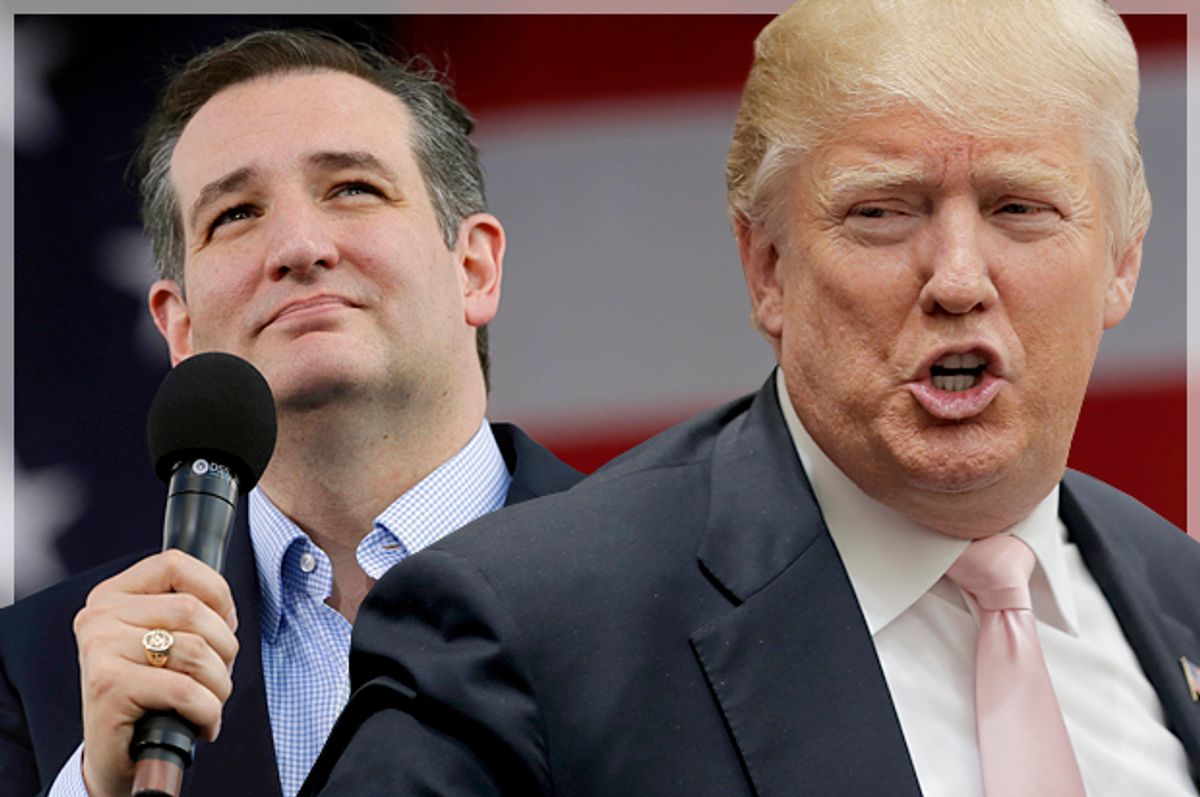Welcome to Super Tuesday! Again! If it seems like “Super Tuesdays” are popping up every week this election cycle, that’s because they are. We already made it through the Southern state primary bonanza of the first Super Tuesday on March 1, and we barely survived the most recent Super Tuesday (cleverly dubbed Super Tuesday 2) on March 8, so now we get to enjoy the most super of the Super Tuesdays: Super Tuesday 3. When all is said and done, at least 60 percent of all Tuesdays this March will have been certified “Super” by pundits and election-watchers – a modern-day record, according to research I just made up.
Joking aside, this Super Tuesday does actually have the potential to radically alter the trajectory of the race for the Republican presidential nomination. So let’s dive in and game out what the hell might happen on Sup3r Tu3sday.
For the Republicans, today marks a big shift as some states start apportioning delegates on a winner-take-all basis. Up until now, all the delegates have been meted out proportionally or according to a complex system of statewide and district-by-district viability thresholds. This system allowed underperforming candidates (like, say, John Kasich and Marco Rubio) to lose states but still rack up delegates in places and keep themselves, at least nominally, in the game. But today there are huge delegate prizes up for grabs in states like Florida and Ohio, both of which are winner-take-all.
The one thing that seems certain for today is that Florida Sen. Marco Rubio, who has staked what remains of his campaign on winning his home state’s 99 delegates, is in deep trouble. There were a few polls conducted earlier in the month that put him within striking distance of Donald Trump in Florida, but the majority of polls conducted since then put Trump’s lead anywhere from 17 to 24 points. You can believe that the polls are wrong, and you can put faith in Rubio’s ability to outperform the polls and run strongly among late deciders, but he has a yawning gulf to make up. And even if he did pull out a miraculous victory, he still doesn’t have a viable path to the nomination.
Everywhere else you look there if far less certainty. Ohio once looked to be fairly strong territory for Donald Trump, but John Kasich has mounted a late surge in his home state and now actually leads Trump in the polling averages by a couple of points. The state’s 66 delegates are, again, winner-take-all, so it will be the state to watch tonight. If Kasich loses, his campaign will end. At the same time, victory in Ohio won’t help Kasich win the nomination (it’s just about mathematically impossible for him to reach the required number of delegates) but if he denies Trump those delegates, that makes it all the more difficult for the Mussolini-lite frontrunner to win. And if Kasich does take Ohio and Rubio drops out, he’ll lay claim to being the establishment favorite by default and might not feel compelled to quit the race anytime soon, which would deny Ted Cruz the one-on-one fight with Trump he’s been itching for.
The rest of the big prizes on the map – Illinois, Missouri, and North Carolina – are tests of Cruz’s strength as a candidate. As David Wasserman writes, his best chance for an outright win seems to be Missouri, with its high share of evangelical voters. Then again, there’s been one poll of Missouri conducted recently, and it shows Trump with a seven-point lead. But if Cruz can sneak out a win in Missouri, he’ll receive a nice little delegate boost (eight per congressional district won, and 12 for winning the statewide vote). Illinois is looking more favorable to Trump, though not necessarily in the bag – the polls conducted in March show him with leads as high as 13 points, but the most recent only has him up four. If Cruz can’t win in Illinois, though, he may be able to deny Trump some delegates – Trump’s campaign there is apparently a disorganized mess, and Cruz is making a late play to close the gap. North Carolina, meanwhile, is looking pretty Trumpy in the way that South Carolina and much of the rest of the old Confederacy have been strong territory for Trump. But North Carolina is also the only state voting today that metes out delegates on a purely proportional basis, so for Cruz, every 1.39 percent of the vote he can snatch from Trump is one less delegate Trump has going into the convention.
So the basic makeup of Sup3r Tu3sday isn’t really all that different from the other Super Tuesdays: Trump seems to be leading, but he’s vulnerable in certain key places that may cost him delegates. But the changing delegate rules mean the stakes are higher. The Ohio vote in particular will determine how the race looks going forward – it could be a two-man race with Trump in a commanding lead, or a three-man race with Trump holding off Cruz and Kasich hanging on for dear life.

Shares